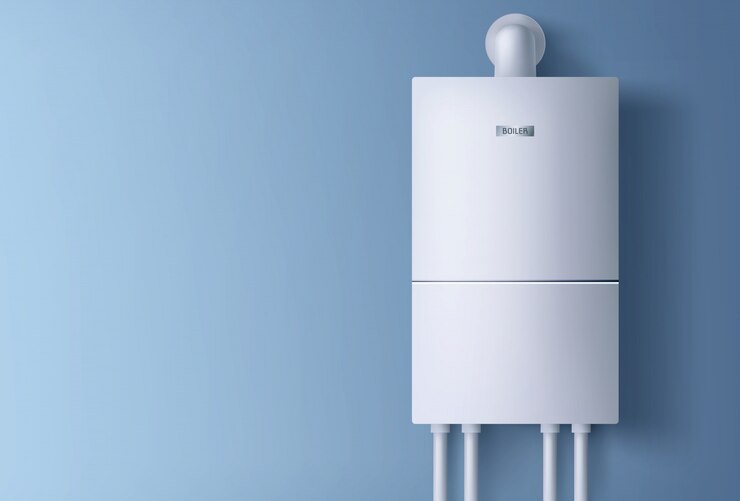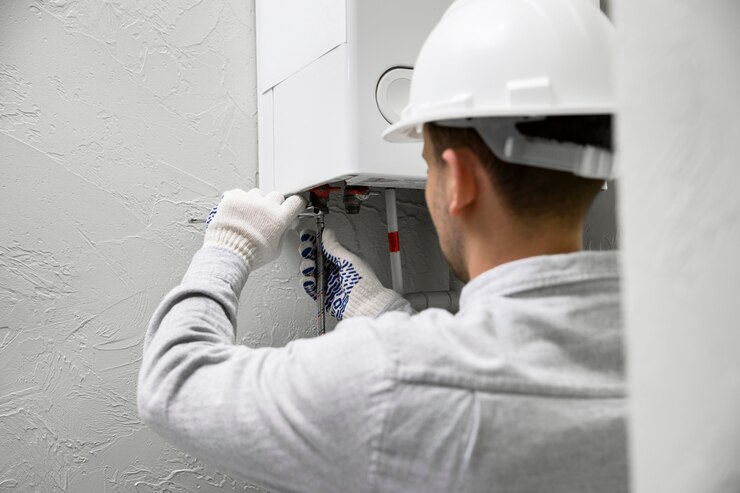There are additional considerations besides hot showers when choosing a water heater for your house. You must also strike a balance between price, usefulness, and comfort. It can be difficult to choose between gas and electric water heaters, which are the primary options. This article examines how the two differ, breaking down every aspect from setup to long-term cost savings. Our services can help you choose a water heater that fits your budget and demands, whether you’re installing a new system or upgrading an old one.
Overview of Electric Water Heaters
Electric water heaters are a go-to choice for tons of homes because they’re so easy to use. They work by heating water with electric coils inside a tank, keeping it nice and hot until you need it at the faucet. They’re especially awesome for apartments or houses without gas lines since you don’t have to mess with gas hookups or complicated venting systems. Plus, installation is a breeze! Another big perk? You don’t have to worry about gas leaks, making them a safer choice.
That said, electric heaters have their quirks. Running them can get expensive if the cost of electricity in your location is high. If your home uses a lot of hot water, such as on a busy morning when everyone is taking showers at once, it may also take longer than gas versions to reheat the tank. Nevertheless, they are a dependable option for smaller households or those that are not connected to the gas grid.
What are Gas Water Heaters
An alternative set of benefits is offered by a gas water heater that runs on propane or natural gas. These heaters recover more quickly than electric types because they employ a burner to rapidly warm the water. For larger families or anyone who requires a consistent supply of hot water, it is a huge win. If gas is cheap where you live, you can also save money over time.
But there is also a reverse aspect. Should you happen to have a house that is not “on the gas” and you decide to install a gas heater, then the situation might become more difficult and the budget more expensive. A gasline that is not only a gas line but also an adequate ventilation system in place to control the emission of harmful gases is needed. The latest models come with safety devices that include automatic shut-offs and prevent gas leaks, which is a minor drawback. Not only do they need to be serviced more often due to the venting system and the burner, but also with more intense care.
Key Factors to Consider When Choosing
When it’s time to choose a water heater, a few key details can steer you in the right direction:
- Energy Source: No gas line? An electric water heater is your go-to. Adding a gas line for a gas water heater could mean extra costs.
- Hot Water Needs: Big household? Gas heaters heat water faster, keeping up with demand. Smaller homes might do fine with electric.
- Space: Electric units are more adaptable than gas ones, which require space for venting.
- Efficiency: Look for a higher energy factor (EF) rating, which indicates more efficiency. Although local utility prices are more important, electric models frequently do better locally.
- Eco-Friendliness: On the green scale, electric power is superior if it is generated by solar or wind.
Safety and Professional Installation
Safety isn’t something to skimp on with water heaters. A gas water heater involves flammable fuel, so proper ventilation and leak detection are musts. Electric models sidestep those risks, but you’ve still got to make sure the wiring’s up to snuff to avoid any electrical headaches. Both gas and electric types get a boost from modern safety features like flame arrestors for gas models or overheat protection for electric ones, but those are only as good as how well they’re installed. For top-notch service, you can contact Fuse Service to install a new water heater that’s safe and efficient.
Comparing Costs: Upfront vs. Long-Term
Since money speaks, let’s examine the figures:
- Upfront: Electric water heaters usually cost less to buy and set up. Gas models might mean shelling out more if you need to add a gas line or venting.
- Long-Term: This depends on your area. Cheap gas? A gas water heater could cut your bills. Low electricity rates or solar power? Electric might edge out. Maintenance can tip the scales, too; gas units often need more TLC.
Tips for Making the Final Decision
Here’s how to nail down your choice:
- Know Your Usage: When and how much hot water do you use? Gas shines for heavy demand.
- Check Rates: Compare local gas and electric prices; big savings could sway you.
- Think Ahead: Planning solar panels? Electric pairs well with that.
In Conclusion
With the right setup, gas can save money and provide speed, but electric gives convenience and security. For peace of mind, expert installation is a must regardless of your choice. Are you prepared to take the risk? To install a new water heater and customize the hot water flow, get in touch with Fuse Service.










